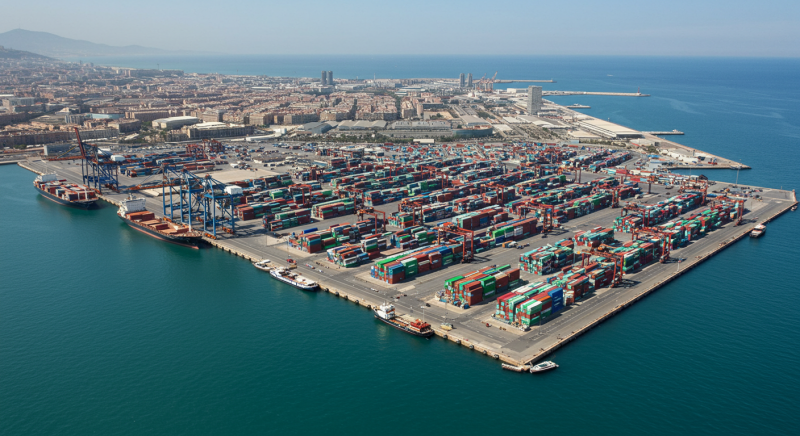Every Nigerian entrepreneur dreams of expanding their horizons beyond familiar shores, and Spain beckons with promise and opportunity. The Spain self-employment visa represents more than just a pathway to Europe—it’s your ticket to transforming dreams into reality while building a prosperous future in one of Europe’s most vibrant economies. Imagine waking up in Barcelona, sipping café con leche while planning your next business move, knowing you’ve successfully navigated the immigration system that once seemed impossibly complex.
The Spain self-employment visa has become increasingly attractive to Nigerian business owners seeking European market access, offering a legitimate route to establish residency while pursuing entrepreneurial ventures. This comprehensive guide breaks down everything you need to know about securing your Spain self-employment visa, from investment thresholds to business plan requirements, ensuring you approach this life-changing opportunity with confidence and clarity.
Key Takeaways
Understanding the Spain self-employment visa process requires grasping several critical elements that determine your success. The visa demands a minimum monthly income equivalent to 200% of Spain’s national minimum wage, approximately €2,763 monthly. You’ll need comprehensive business documentation, proof of professional qualifications, sufficient financial resources, and a detailed business plan demonstrating economic viability. The application process typically takes 2-3 months, requiring careful preparation and attention to detail. Barcelona offers exceptional opportunities for Nigerian entrepreneurs, particularly in technology, hospitality, and international trade sectors.

Understanding Spain’s Self-Employment Visa Framework
The Spain self-employment visa, officially known as “Visa de Residencia Temporal y Trabajo por cuenta propia,” serves as Spain’s gateway for non-EU entrepreneurs seeking to establish businesses or freelance operations within Spanish territory. The Self-Employment Visa in Spain, also known as the Autónomo Visa, allows non-EU citizens to live and work in Spain while managing their own business.
This visa category differs significantly from traditional work visas because it grants holders the autonomy to operate their own enterprises rather than working for Spanish employers. Nigerian applicants must demonstrate their ability to generate sustainable income through self-employment activities, whether launching startups, consulting practices, or establishing import-export businesses connecting Nigerian and Spanish markets.
The Spain self-employment visa carries particular appeal for Nigerian entrepreneurs because it provides a structured pathway to European Union market access. Once established in Spain, visa holders can explore business opportunities throughout the Schengen zone, expanding their operational reach across 27 European countries. This strategic advantage makes Barcelona an ideal launching point for ambitious Nigerian business owners seeking international expansion.
Investment Thresholds and Financial Requirements
Securing your Spain self-employment visa requires meeting specific financial benchmarks that demonstrate your economic capacity to sustain both personal living expenses and business operations. To be eligible for a Spain Freelance Visa, you must show that you earn at least 200% of the Spanish national minimum wage, which is approximately €2,763 per month.
These financial requirements serve multiple purposes within the Spain self-employment visa framework. Spanish authorities want assurance that applicants won’t become public burdens, while simultaneously ensuring proposed businesses possess adequate capitalization for success. The €2,763 monthly threshold represents the minimum acceptable income level, though many successful applicants demonstrate significantly higher earning potential to strengthen their applications.
Spanish Immigration Law does not set a fixed minimum investment amount. Your business plan must show the funds you will need to set up your business. This flexibility allows Nigerian entrepreneurs to tailor their financial presentations according to their specific business models, whether launching tech startups requiring minimal capital or establishing import businesses needing substantial inventory investments.
The absence of rigid investment thresholds means your Spain self-employment visa application should focus on demonstrating realistic financial projections rather than meeting arbitrary capital requirements. Successful applicants typically present comprehensive financial documentation including bank statements, business projections, and proof of available capital reserves.
Business Plan Requirements for Spanish Immigration
Crafting a compelling business plan represents the cornerstone of any successful Spain self-employment visa application. A detailed business plan that covers your business activities, investment, expected profits, and job opportunities forms the foundation upon which Spanish immigration authorities evaluate your application’s viability.
Your business plan for the Spain self-employment visa must address several critical components that demonstrate both economic feasibility and social benefit. The document should clearly articulate your business concept, target market analysis, competitive landscape assessment, operational structure, marketing strategy, and detailed financial projections covering at least three years of anticipated operations.
Nigerian entrepreneurs applying for the Spain self-employment visa should emphasize how their businesses will contribute to Spanish economic development. This might include creating employment opportunities for Spanish workers, facilitating trade relationships between Nigeria and Spain, or introducing innovative products and services to Spanish markets. Immigration authorities favor applications demonstrating clear economic benefits to Spanish society.
The business plan should also address practical operational considerations such as office location preferences, supply chain logistics, regulatory compliance strategies, and risk management approaches. Barcelona-specific considerations might include discussions of Catalonia’s business environment, local market conditions, and integration strategies within Barcelona’s entrepreneurial ecosystem.
Documentation and Application Process
The Spain self-employment visa application process demands meticulous attention to documentation requirements, with Spanish immigration authorities maintaining strict standards for acceptable evidence. A set-up or activity project must be submitted, along with proof of professional capacity or qualification and the investment necessary.
Essential documentation for your Spain self-employment visa includes a valid passport with at least twelve months validity, completed EX-07 application form, criminal background checks from Nigeria and any other countries where you’ve resided, medical certificates confirming good health, proof of adequate health insurance coverage, and academic or professional qualification certificates with apostille authentication.
Financial documentation supporting your Spain self-employment visa application must include bank statements covering the previous six months, proof of income sources, tax returns from previous years, and documentation demonstrating available capital for business establishment. Spanish authorities scrutinize financial evidence carefully, so ensure all documents are authentic, properly translated, and apostilled where required.
The application timeline for Spain self-employment visa processing typically ranges from two to three months, assuming complete documentation submission. Nigerian applicants should initiate the process well in advance of planned travel dates, allowing sufficient time for document preparation, translation, apostille procedures, and potential requests for additional information from Spanish immigration authorities.
Barcelona: Your Gateway to European Business Success
Barcelona stands as Spain’s entrepreneurial capital, offering Nigerian business owners an ideal environment for launching and scaling international enterprises. The city’s strategic Mediterranean location, robust infrastructure, diverse international community, and thriving startup ecosystem make it particularly attractive for Spain self-employment visa holders seeking European market entry.
The Catalonian capital provides numerous advantages for Nigerian entrepreneurs pursuing the Spain self-employment visa pathway. Barcelona’s Port, one of Europe’s largest, facilitates efficient import-export operations, particularly valuable for Nigerian business owners focusing on international trade. The city’s tech sector continues expanding rapidly, creating opportunities for Nigerian entrepreneurs with digital expertise to establish consulting practices or tech startups.
Barcelona’s multicultural business environment welcomes international entrepreneurs, with numerous co-working spaces, accelerator programs, and networking organizations specifically designed to support foreign business owners. This supportive ecosystem proves invaluable for Spain self-employment visa holders during their initial establishment period, providing resources, mentorship, and partnership opportunities.
The city’s quality of life factors also enhance Barcelona’s appeal for Nigerian families considering the Spain self-employment visa route. Excellent healthcare systems, quality educational institutions, efficient public transportation, and rich cultural offerings create an attractive living environment for entrepreneurs and their families.

Step-by-Step Application Guide
Successfully obtaining your Spain self-employment visa requires following a systematic approach that addresses each requirement comprehensively. Begin by conducting thorough market research for your proposed business concept, ensuring it aligns with Spanish market demands and regulatory requirements.
Develop your comprehensive business plan, incorporating all elements discussed previously while tailoring content specifically to Barcelona’s market conditions. Engage professional translation services to ensure all documents meet Spanish immigration standards, and obtain necessary apostille certifications for official documents.
Complete the EX-07 application form meticulously, ensuring all information aligns perfectly with supporting documentation. Schedule appointments with Spanish consular services in Nigeria well in advance, as appointment availability can be limited during peak application periods.
Prepare for your consular interview by reviewing your business plan thoroughly and anticipating questions about your entrepreneurial background, business concept, financial projections, and integration plans for Spanish society. Demonstrate genuine commitment to establishing long-term roots in Spain while contributing positively to the local economy.
Common Pitfalls and How to Avoid Them
Many Nigerian applicants encounter preventable obstacles during their Spain self-employment visa journey, often stemming from inadequate preparation or misunderstanding of requirements. Document authentication represents a frequent stumbling block, with applicants sometimes failing to obtain proper apostille certifications or providing translations that don’t meet official standards.
Financial documentation errors commonly derail Spain self-employment visa applications, particularly when bank statements show inconsistent balances or income sources appear inadequately documented. Ensure your financial records demonstrate consistent income streams and sufficient capital reserves to support both personal expenses and business operations.
Business plan deficiencies frequently result in Spain self-employment visa rejections, especially when applicants present overly optimistic projections without supporting market research or fail to address competitive landscape realities. Ground your business plan in realistic market analysis while demonstrating clear understanding of Spanish business regulations and cultural considerations.
Timing miscalculations can create significant stress during the Spain self-employment visa process, particularly when applicants underestimate documentation preparation time or consular processing delays. Begin your application process at least six months before your intended travel date, allowing adequate buffer time for unexpected complications.
Integration Strategies for Nigerian Entrepreneurs
Successful Spain self-employment visa holders understand that obtaining the visa represents just the beginning of their Spanish entrepreneurial journey. Cultural integration strategies prove crucial for long-term business success, requiring understanding of Spanish business etiquette, networking customs, and relationship-building approaches.
Language acquisition, while not mandatory for Spain self-employment visa approval, significantly enhances business prospects in Barcelona. Spanish proficiency facilitates deeper customer relationships, smoother vendor negotiations, and more effective networking opportunities within local business communities.
Professional networking becomes essential for Spain self-employment visa holders seeking to establish credible business reputations. Join Barcelona’s Chamber of Commerce, attend industry-specific events, participate in entrepreneur meetups, and engage with local business organizations to build valuable professional relationships.
Understanding Spanish tax obligations and business registration requirements ensures compliance with local regulations while maximizing operational efficiency. Consider engaging local accountants and legal advisors during your initial establishment period to navigate complex regulatory requirements successfully.
Renewal and Permanent Residency Pathways
The initial Spain self-employment visa grants one-year residency, renewable for additional two-year periods based on continued business activity and compliance with visa conditions. Renewal applications require demonstrating ongoing business operations, tax compliance, and sufficient income generation to maintain self-employment status.
After five years of continuous legal residence through the Spain self-employment visa pathway, holders become eligible for permanent residency applications. Permanent residency status eliminates renewal requirements while maintaining all business operation rights, providing greater long-term security for established entrepreneurs.
Spanish citizenship becomes possible after ten years of legal residency, though this timeline can be reduced to two years for citizens of certain Latin American countries. Nigerian entrepreneurs should consult immigration attorneys regarding specific citizenship pathways and requirements applicable to their situations.
Maintaining detailed records of business activities, tax payments, and compliance with visa conditions throughout your Spain self-employment visa tenure ensures smooth renewal processes and supports future permanent residency applications.

Conclusion
The Spain self-employment visa offers Nigerian entrepreneurs an exceptional opportunity to establish thriving businesses while gaining access to European markets. Success requires thorough preparation, realistic financial planning, comprehensive business documentation, and genuine commitment to contributing positively to Spanish society.
Barcelona’s dynamic business environment, strategic location, and supportive entrepreneurial ecosystem make it an ideal destination for Nigerian business owners pursuing the Spain self-employment visa pathway. The city’s multicultural atmosphere, robust infrastructure, and growing international business community create favorable conditions for entrepreneurial success.
Remember that obtaining your Spain self-employment visa marks the beginning, not the end, of your Spanish business journey. Continued success depends on cultural integration, professional networking, regulatory compliance, and persistent dedication to building sustainable business operations that benefit both your entrepreneurial ambitions and Spanish economic development.
Frequently Asked Questions
How long does the Spain self-employment visa application process take? The Spain self-employment visa processing typically requires 2-3 months from complete application submission to decision notification. However, document preparation and apostille procedures may extend the overall timeline to 4-6 months, so begin preparations well in advance of your intended travel date.
Can I include my family in my Spain self-employment visa application? Yes, Spain self-employment visa holders can include spouses and dependent children in their applications. Family members must meet additional financial threshold requirements, with applicants demonstrating increased income levels to support all family members during their Spanish residency.
What happens if my business fails after obtaining the Spain self-employment visa? Business failure doesn’t automatically invalidate your Spain self-employment visa, but you must maintain minimum income levels through alternative self-employment activities. Consider pivoting to consulting, freelancing, or launching new business ventures to maintain visa compliance while rebuilding your entrepreneurial foundation.
Do I need to speak Spanish to qualify for the Spain self-employment visa? Spanish language proficiency is not a formal requirement for Spain self-employment visa approval. However, Spanish skills significantly enhance business prospects, customer relationships, and overall integration success in Barcelona’s business community.
Can I work for other companies while holding a Spain self-employment visa? The Spain self-employment visa restricts holders to self-employment activities only. You cannot work as an employee for Spanish companies while maintaining this visa status. Focus exclusively on developing your own business ventures to ensure visa compliance.
Read more 5 Common Mistakes Nigerians Make in Job Interviews – And How to Avoid Them to Land Your Dream Job!
